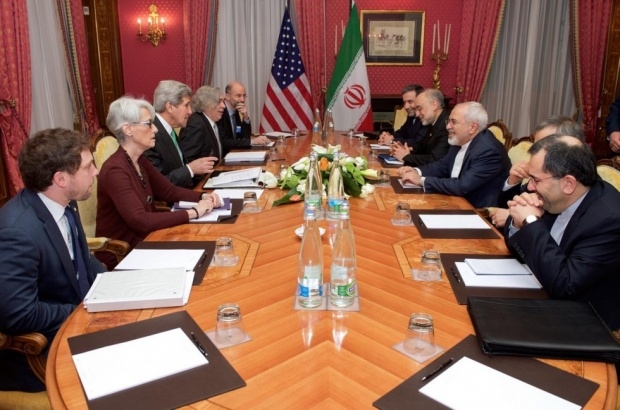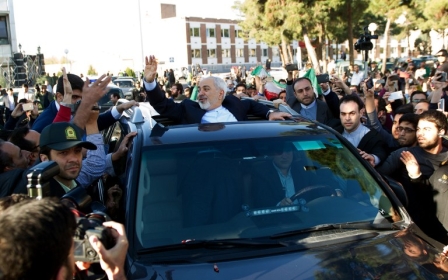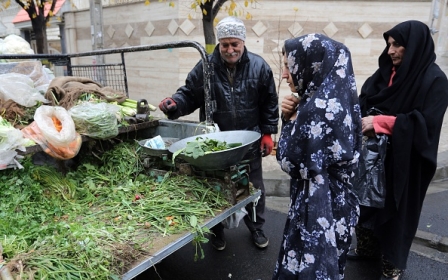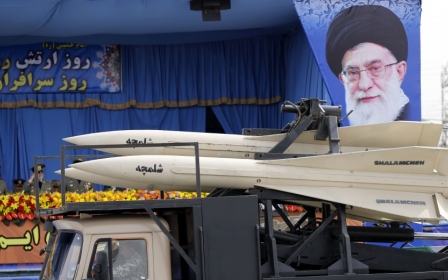The Iran nuclear agreement: You can't expect people to walk on water

The vast majority of the Iranian people aspire to have democracy and, thus, want to make a peaceful transition from an Islamic theocracy to a democratic state. They deserve to have democracy and no one should put obstacles in their way. The Iranians know that they must build democracy in Iran. They also know that they cannot walk on water, or create a peaceful democracy in the shadow and threat of war.
But there are western governments, as well as members of the Iranian opposition in diaspora that want Iranians to go through hellfire to achieve their aspirations. More Iranians reject this, because they have closely followed the experiences of other nations in their region over the past decade or so, and see that the Middle East is soaked with blood. They know the fates of Afghanistan, Iraq, Libya, Syria and Yemen - nations that were either invaded by the United States, bombed back to the Medieval age (Libya) or destroyed by a sectarian war instigated by US allies in the Middle East (Syria).
None of these nations has become a democratic state. The state of human rights in all of these nations is far worse than before their crippling wars. Their national security systems have collapsed and terrorism has spread. The only “fruits” of the military intervention in the Middle East and North Africa over the past 15 years have been civil wars, terrorism and disintegration of nation states. Since the attacks of 11 September 2001, at least 1.3 million people have been killed in Afghanistan, Iraq and Pakistan. Millions of people have either been injured or have become internal refugees within their own countries or abroad.
Iranian people want democracy, but they are keenly aware that security and peace are the prerequisites for building democracy and respect for human rights. Iranians rejoiced after the joint political statement by Iran and P5+1 was read in Lausanne, Switzerland by Federica Mogherini, the High Representative of the European Union for Foreign Affairs, outlining the framework of the agreement between the two sides over Iran’s nuclear programme.
Why were the Iranian people so happy and celebrating in the streets? Was the announcement a great victory for their nation? It surely was not politically, because Iran made many concessions, and received comparatively little in return.
But it was indeed a great victory for Iran and Iranians, if we look at it from a democracy angle. In the view of Iranians, the negotiations between Iran and P5+1 was a “wrestling match” between war and peace. War was defeated by peace, and its threat was destroyed. It was a hopeful sign for Iranians everywhere.
When a nation such as Iran is threatened by the US and Israel for over two decades, and suffers from the most crippling economic sanctions in history, democracy becomes an impossible dream for its people, who live instead in terror and fear of war. Even now, after the announcement of the Lausanne agreement, Israeli leaders continue to threaten Iran with military attacks.
The Islamic Republic’s dictatorship used the threat of military action to increase its repression of the Iranian people, accusing the opposition of treason and being turncoats. Once the shadow of war was removed, the regime lost its pretence. But repression may still persist. Khamenei will not begin the process of building a democratic nation alone.
A new poll indictates that 82.6 percent of the Iranian people felt “happiness, tranquillity, and hope for the future” after they heard about the Lausanne agreement. After the announcement of the agreement, US President Barack Obama said that there were only three ways to address the crisis over Iran’s nuclear programme: reach a diplomatic resolution of the problem, bomb Iran’s nuclear infrastructure, or impose even harsher economic sanctions that will eventually lead to war.
The president’s admission of the link between economic sanctions and war was very important. Any military attacks on Iran will not only destroy Iran, but will also add more misery, bloodshed and destruction to the languishing region that is called the Middle East.
Iranians, for the most part, are very happy with the Lausanne agreement, and they should be, because they want better lives and a hopeful future. This agreement may make that possible. Iranians also understand, much better than the political opposition in diaspora, that national security, peace with other nations, a high rate of economic growth, eliminating poverty and reducing unemployment and inflation are the prerequisites to democracy. Without these things, democracy has no meaning.
It is said in the New Testament that Jesus’s disciples were waiting for him by a lake to cross it. Night came but there was no sign of him returning from the mountain. They got into a boat to cross the lake but, shortly after leaving the shore, strong winds began blowing and the water became stormy.
“When they had rowed about three or four miles, they saw Jesus approaching the boat, walking on the water; and they were frightened. But he said to them, 'It is I; don’t be afraid.' Then they were willing to take him into the boat, and immediately the boat reached the shore where they were heading.” )John 6:19-21).
Like Jesus’s disciples, the people of Iran cannot walk on the water or build democracy under impossible circumstances. They cannot foster liberty and human rights for their people in the fires of hell, created by war, bloodshed and destruction.
Likewise, Obama is well aware that he is not the messiah. He cannot walk on water and he cannot guarantee Israel’s security. In his statement after the announcement of the agreement with Iran, Obama told Israeli Prime Minister Benyamin Netanyahu that if he wants security for his nation, the agreement with Iran provides the path for it. Netanyahu, however, has an apocalyptic view and wants war. Before departing for the US to speak to a joint session of Congress on 3 March, he prayed at the Western Wall in Jerusalem and told the Israeli people that he was on a historic mission. More, he insisted that the Palestinians must accept Israel as a Jewish state.
To the Iranians, though, who have experienced an “Islamic Republic”, invoking religion as an element of a nation’s recognition is tantamount to distancing oneself from democracy and respect for human rights. Israel, Arab nations of the Middle East and the hawks in both Tehran and Washington are all opposed to a nuclear agreement between Iran and P5+1. They prefer war over peace.
If western nations are truly interested in the development of democracy in Iran, they should set aside military threats and economic sanctions. Peace and economic well-being is directly linked with democracy. War has utterly destroyed Afghanistan, Iraq, Syria and Libya, and sanctions have crippled Cuba and North Korea.
After the announcement of the nuclear agreement, President Hassan Rouhani spoke to his nation, saying: “The nuclear accord is the first step. Iran wishes to improve its relations with all nations. If there is tension between us and some nations [such as the United States], or even enmity, we wish to end it. Undoubtedly, this will be in everyone’s interest.” Indeed, this will also be in the interest of peacefully building democracy in Iran.
But, if western powers continue trying to keep Iran’s nuclear dossier in the UN Security Council even after Iran carries out its obligations under the final accord to be signed by the end of June, the message to the Iranian people will be crystal clear: they will be subjected to continuing their lives in the shadow of war and permanent threat. Under such conditions, expecting the Iranian people to build democracy is like expecting them to walk on water.
- Akbar Ganji is an Iranian journalist and writer. He has been described as "Iran's preeminent political dissident", and a "wildly popular pro-democracy journalist" who has crossed press censorship "red lines" regularly. A supporter of the Islamic revolution as a youth, he became disenchanted in the mid-1990s and served time in Tehran's Evin Prison from 2001 to 2006 after publishing a series of stories on the murder of dissident authors known as the Chain Murders of Iran. While in prison he issued a manifesto which established him as the first "prominent dissident, believing Muslim and former revolutionary" to call for a replacement of Iran's theocratic system with "a democracy".
This article was translated by Ali N. Babaei
Middle East Eye propose une couverture et une analyse indépendantes et incomparables du Moyen-Orient, de l’Afrique du Nord et d’autres régions du monde. Pour en savoir plus sur la reprise de ce contenu et les frais qui s’appliquent, veuillez remplir ce formulaire [en anglais]. Pour en savoir plus sur MEE, cliquez ici [en anglais].





